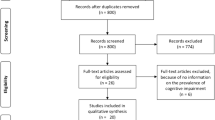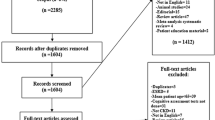Abstract
Introduction
Cognitive dysfunction is a major consequence of end-stage renal disease (ESRD) and has further detrimental effects on both functionality and the quality of life for patients. While peritoneal dialysis is generally advocated in ESRD, there is a substantial knowledge gap about the differential effects of chronic dialysis modalities on cognitive dysfunction and decline. The aim of this meta-analysis is to evaluate cognitive function in peritoneal dialysis versus hemodialysis patients.
Methods
We performed a systematic review in different databases to identify studies that assessed the effect of different dialysis modalities on cognitive functions. Inclusion criteria for our meta-analysis were all studies that compared the effects of peritoneal dialysis on cognitive functions compared to intermittent hemodialysis. The data collected were the name of the first author, journal title, year of publication, country where the study was conducted, number of patients in the peritoneal dialysis and hemodialysis arms and methods of assessment of cognitive functions.
Results
Out of 2769 abstracts reviewed in different databases, 11 papers were included in our meta-analysis. Altogether, 195,774 patients were included in the final analysis. The forest plot analysis of the rate of cognitive impairment in different dialysis modalities showed decreased risk of cognitive impairment in the peritoneal dialysis population compared to hemodialysis patients (relative risk = 0.634, confidence interval ranges from 0.508 to 0.790). There was evidence of significant heterogeneity among studies with p < 0.0001 and I2 = 85.5%. The sensitivity analysis limited to studies on patients younger than 65 years of age showed similar results (relative risk = 0.516; 95% confidence intervals: 0.379–0.704).
Conclusion
Patients on peritoneal dialysis demonstrated a lower odd of cognitive dysfunction compared to those on hemodialysis. Future prospective studies should assess cognitive decline as a meaningful outcome in dialysis patients.




Similar content being viewed by others
References
Shea YF, Lam MF, Lee MS et al (2016) Prevalence of cognitive impairment among peritoneal dialysis patients, impact on peritonitis and role of assisted dialysis. Perit Dial Int 36(3):284–290
Tiffin-Richards FE, Costa AS, Holschbach B et al (2014) The Montreal cognitive assessment (MoCA)—a sensitive screening instrument for detecting cognitive impairment in chronic hemodialysis patients. PLoS ONE 9(10):e106700
Bachman DL, Wolf PA, Linn R et al (1992) Prevalence of dementia and probable senile dementia of the Alzheimer type in the Framingham study. Neurology 42(1):115–119
Kurella Tamura M, Larive B, Unruh ML et al (2010) Prevalence and correlates of cognitive impairment in hemodialysis patients: the frequent hemodialysis network trials. Clin J Am Soc Nephrol 5(8):1429–1438
Lai S, Mecarelli O, Pulitano P et al (2016) Neurological, psychological, and cognitive disorders in patients with chronic kidney disease on conservative and replacement therapy. Medicine (Baltimore) 95(48):e5191
Hart RP, Pederson JA, Czerwinski AW, Adams RL (1983) Chronic renal failure, dialysis, and neuropsychological function. J Clin Neuropsychol 5(4):301–312
Ozcan H, Yucel A, Avsar UZ et al (2015) Kidney transplantation is superior to hemodialysis and peritoneal dialysis in terms of cognitive function, anxiety, and depression symptoms in chronic kidney disease. Transplant Proc 47(5):1348–1351
Sarnak MJ, Tighiouart H, Scott TM et al (2013) Frequency of and risk factors for poor cognitive performance in hemodialysis patients. Neurology 80(5):471–480
Perneczky R, Pohl C, Sorg C et al (2006) Complex activities of daily living in mild cognitive impairment: conceptual and diagnostic issues. Age Ageing 35(3):240–245
Burton CL, Strauss E, Bunce D, Hunter MA, Hultsch DF (2009) Functional abilities in older adults with mild cognitive impairment. Gerontology 55(5):570–581
Ahn IS, Kim JH, Kim S et al (2009) Impairment of instrumental activities of daily living in patients with mild cognitive impairment. Psychiatry Investig 6(3):180–184
Stilley CS, Bender CM, Dunbar-Jacob J, Sereika S, Ryan CM (2010) The impact of cognitive function on medication management: three studies. Health Psychol 29(1):50–55
Dahbour SS, Wahbeh AM, Hamdan MZ (2009) Mini mental status examination (MMSE) in stable chronic renal failure patients on hemodialysis: the effects of hemodialysis on the MMSE score. A prospective study. Hemodialysis Int Int Symp Home Hemodialysis. 13(1):80–85
Sorensen EP, Sarnak MJ, Tighiouart H et al (2012) The kidney disease quality of life cognitive function subscale and cognitive performance in maintenance hemodialysis patients. Am J Kidney Dis 60(3):417–426
O'Lone E, Connors M, Masson P et al (2016) Cognition in people with end-stage kidney disease treated with hemodialysis: a systematic review and meta-analysis. Am J Kidney Dis 67(6):925–935
Lee SH, Cho A, Min YK, Lee YK, Jung S (2018) Comparison of the Montreal cognitive assessment and the mini-mental state examination as screening tests in hemodialysis patients without symptoms. Ren Fail 40(1):323–330
Garcia-Canton C, Rodenas A, Lopez-Aperador C et al (2019) Frailty in hemodialysis and prediction of poor short-term outcome: mortality, hospitalization and visits to hospital emergency services. Ren Fail 41(1):567–575
Fulop T, Zsom L, Tapolyai MB et al (2017) Peritoneal dialysis: the unique features by compartmental delivery of renal replacement therapy. Med Hypotheses 108:128–132
Zsom L, Zsom M, Fulop T, Flessner MF (2008) Treatment time, chronic inflammation, and hemodynamic stability: the overlooked parameters in hemodialysis quantification. Semin Dial 21(5):395–400
Hagberg B (1974) A prospective study of patients in chronic hemodialysis-III. Predictive value of intelligence, cognitive deficit and ego defence structures in rehabilitation. J Psychosom Res. 18(3):151–160
McKee DC, Burnett GB, Raft DD, Batten PG, Bain KP (1982) Longitudinal study of neuropsychological functioning in patients on chronic hemodialysis: a preliminary report. J Psychosom Res 26(5):511–518
Search HDA. NICE Healthcare Databases Advanced Search. 2020; https://hdas.nice.org.uk/.
Stroup DF, Berlin JA, Morton SC et al (2000) Meta-analysis of observational studies in epidemiology: a proposal for reporting. Meta-analysis of observational studies in epidemiology (MOOSE) group. JAMA 283(15):2008–2012
Clarke M, Horton R (2001) Bringing it all together: lancet-cochrane collaborate on systematic reviews. Lancet 357(9270):1728
Kontopantelis E, Reeves D. MetaEasy: a meta-analysis add-in for microsoft excel. 2009. 2009;30(7):25.
Sithinamsuwan P, Niyasom S, Nidhinandana S, Supasyndh O (2005) Dementia and depression in end stage renal disease: comparison between hemodialysis and continuous ambulatory peritoneal dialysis. J Med Assoc Thai 88(Suppl 3):S141–147
Kalirao P, Pederson S, Foley RN et al (2011) Cognitive impairment in peritoneal dialysis patients. Am J Kidney Dis 57(4):612–620
Jung S, Lee YK, Choi SR, Hwang SH, Noh JW (2013) Relationship between cognitive impairment and depression in dialysis patients. Yonsei Med J 54(6):1447–1453
Lambert K, Mullan J, Mansfield K, Lonergan M (2017) Comparison of the extent and pattern of cognitive impairment among predialysis, dialysis and transplant patients: a cross-sectional study from Australia. Nephrology (Carlton, Vic) 22(11):899–906
Neumann D, Robinski M, Mau W, Girndt M (2017) Cognitive testing in patients with CKD: the problem of missing cases. Clin J Am Soc Nephrol 12(3):391–398
Iyasere O, Okai D, Brown E (2017) Cognitive function and advanced kidney disease: longitudinal trends and impact on decision-making. Clin Kidney J 10(1):89–94
Neumann D, Mau W, Wienke A, Girndt M (2018) Peritoneal dialysis is associated with better cognitive function than hemodialysis over a one-year course. Kidney Int 93(2):430–438
Molnar MZ, Sumida K, Gaipov A et al (2017) Pre-ESRD dementia and post-ESRD mortality in a large cohort of incident dialysis patients. Dement Geriatr Cogn Disord 43(5–6):281–293
Wolfgram DF, Szabo A, Murray AM, Whittle J (2015) Risk of dementia in peritoneal dialysis patients compared with hemodialysis patients. Perit Dial Int 35(2):189–198
Hung PH, Yeh CC, Hsiao CY et al (2017) End stage renal disease is associated with development of dementia. Oncotarget 8(64):107348–107355
Tian X, Guo X, Xia X, Yu H, Li X, Jiang A (2019) The comparison of cognitive function and risk of dementia in CKD patients under peritoneal dialysis and hemodialysis: a PRISMA-compliant systematic review and meta-analysis. Medicine 98(6):e14390–e14390
Li Y, Pi HC, Yang ZK, Dong J. Associations between small and middle molecules clearance and the change of cognitive function in peritoneal dialysis. J Nephrol. 2019.
Kalaitzidis RG, Karasavvidou D, Tatsioni A et al (2013) Risk factors for cognitive dysfunction in CKD and hypertensive subjects. Int Urol Nephrol 45(6):1637–1646
Keshavarzi G, Barber TJ, Yeoh G, Simmons A, Reizes JA (2013) Two-dimensional computational analysis of microbubbles in hemodialysis. Artif Organs 37(8):E139–144
Fulker D, Keshavarzi G, Simmons A, Pugh D, Barber T (2015) Pulsatility produced by the hemodialysis roller pump as measured by doppler ultrasound. Artif Organs 39(11):945–950
Jonsson P, Lindmark L, Axelsson J, Karlsson L, Lundberg L, Stegmayr B (2018) Formation of blood foam in the air trap during hemodialysis due to insufficient automatic priming of dialyzers. Artif Organs 42(5):533–539
Zsom L ZM, Abdul Salim S, Fülöp T. Subjective global assessment of nutrition, dialysis quality and the theory of the scientific method in Nephrology practice. Artificial Organs. 2020([in press]).
Levendoglu F, Altintepe L, Okudan N et al (2004) A twelve week exercise program improves the psychological status, quality of life and work capacity in hemodialysis patients. J Nephrol 17(6):826–832
Acknowledgements
Parts of this paper have been presented in poster format at the American Society of Nephrology 52nd Annual Kidney Week Meeting, Nov 5–10, 2019, Washington, DC (Abstract published at J Am Soc Nephrol 2019;30:191A). We sincerely appreciated the assistance of Mr. Attila Lénárt‐Muszka during editing and grammar review.
Author information
Authors and Affiliations
Contributions
HA: literature search, data collection, data analysis, writing up. KS: literature search, initial draft of introduction and discussion, revision of manuscript. MM: literature search. AD: data analysis. TS: Shared in draft writing up. TF: literature review, writing up, revision of manuscript. JB: idea, supervision, revision of manuscript, corresponding author.
Corresponding author
Additional information
Publisher's Note
Springer Nature remains neutral with regard to jurisdictional claims in published maps and institutional affiliations.
Rights and permissions
About this article
Cite this article
Ali, H., Soliman, K., Mohamed, M.M. et al. The effects of dialysis modality choice on cognitive functions in patients with end-stage renal failure: a systematic review and meta-analysis. Int Urol Nephrol 53, 155–163 (2021). https://doi.org/10.1007/s11255-020-02603-x
Received:
Accepted:
Published:
Issue Date:
DOI: https://doi.org/10.1007/s11255-020-02603-x




